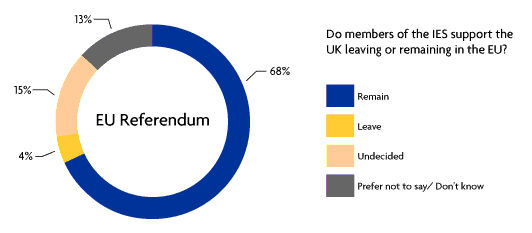The large majority of environmental science professionals believe the UK should remain in the EU, according to a survey of members of the Institution of Environmental Sciences (IES). The strong message coming from a consultation exercise with its members and trustees is that a pan-European approach is essential for tackling complex and transboundary environmental issues or problems.
Only 4% of respondents to an IES membership survey indicated support for the UK leaving the EU, whilst more than two thirds (68%) support the UK remaining. A significant group (15%) were undecided with 13% indicating they would prefer not to say.

In our 2016 membership survey we asked members what their views were on the EU referendum. Here are the results.
The IES Council (its board of Trustees), in a resolution passed in April, were unanimous in agreement that a collaborative, pan-European approach is the most effective way to tackle environmental issues.
The strong support for the EU amongst IES members aligns with findings presented by other bodies that environmental professionals are largely in favour of remaining. Several recent reviews have highlighted the likely risks for the UK environment in the event of Brexit. There is concern amongst IES members and others in the sector that leaving the EU could provoke a race to the bottom and lowering of environmental standards in the UK. Furthermore, if the UK leaves the EU it will lose the opportunity to influence EU policy and regulation on transboundary issues such as air pollution and nature protection.
Professor Sir John Lawton CBE FRS, President of the IES, said:
“The EU has provided a consistent and powerful framework to protect Europe’s habitats and their plants and animals. Three Directives in particular (the Water Framework, The Birds, and the Habitats Directives), together with the Natura 2000 network have played major roles in ensuring there cannot be a ‘race to the bottom’ by individual member states keen to pursue economic growth irrespective of the environmental consequences. There are plenty of politicians in this country who would love to unpick this protective framework, and the consequences if they do, for people and wildlife, don’t bear thinking about.”
The IES strives to promote an evidence-based approach to decision-making regarding the environment. Scientific research is integral to successful environmental protection, but crucially this science needs to be interdisciplinary, collaborative, and often cross-border. Participation in scientific research programmes funded and facilitated by the EU drives ambition and excellence in the UK and elsewhere. Competition for funding with a larger pool of eligible institutions across the EU drives up standards, whilst the collaborations EU projects require can also often generate long-term partnerships.
It is clear to environmental scientists that environmental systems rarely reflect political boundaries, and environmental processes and pollutants rarely respect them. As such, regulation and policy developed at EU level is much more effective in addressing environmental challenges. At this scale, policy makers can take a systems approach to what science shows us are essentially transboundary issues.
Adam Donnan, IES CEO, said:
“The quality of our air, water and biodiversity depends on the actions of our neighbours as well as ourselves. Many environmental challenges can only be efficiently managed on an international scale. Compared to other legislative bodies the EU has a good track record on environmental issues and UK nature has benefited from our membership. Our consultation with our members, staff and trustees shows there is strong support within the environmental science community for the UK to remain in the EU.”
Further information:
- This question was asked as part of the 2016 IES membership survey, which is open only to members of the Institution. 186 respondents answered this question in the survey, approximately 11% of the total membership. The balance of respondents between membership grades was very similar to that of the membership as a whole. More details on the breakdown of respondents is available in our 2016 Membership survey report.
- A recent survey of environmental professionals by the Society for the Environment and the ENDS report found that a large majority (approximately 77%) intended to vote to remain in the EU on the 23rd June. Meanwhile, in a survey of their members the Chartered Institute of Ecology and Environmental Management found that 93% believed the EU has been beneficial for the UK’s natural environment.
- In March 2016, the Institute for European Environmental Policy published a report on The potential policy and environmental consequences for the UK of a departure from the European Union, commissioned by the Wildlife Trusts, RSPB and WWF. The report concluded that “it is likely that a UK departure from the EU would leave the British environment in a more vulnerable and uncertain position than if the country were to remain as a member of the EU”. The House of Commons Environmental Audit Committee have also recently undertaken an inquiry to assess the extent to which EU environmental objectives and policies have succeeded in tackling environmental issues in the UK. In their report the committee highlighted that the overwhelming majority of witnesses to their inquiry believed that the UK’s EU membership has ensured our environment has been better protected than would otherwise have been the case.
For further information on this issue, please contact Robert Ashcroft.



